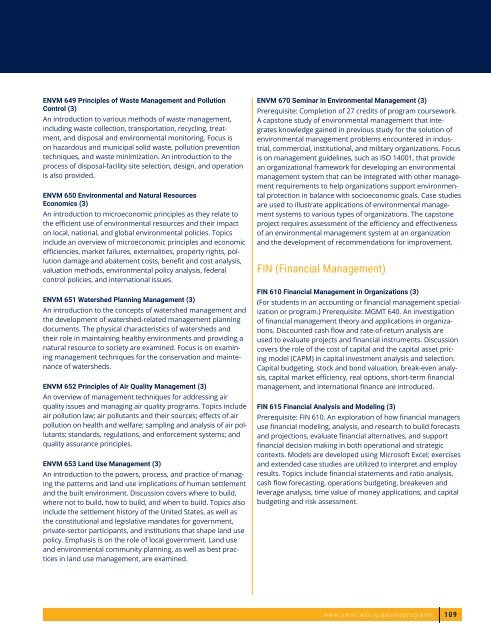2016–2017 2016–2017
2016-2017-graduate-catalog
2016-2017-graduate-catalog
You also want an ePaper? Increase the reach of your titles
YUMPU automatically turns print PDFs into web optimized ePapers that Google loves.
ENVM 649 Principles of Waste Management and Pollution<br />
Control (3)<br />
An introduction to various methods of waste management,<br />
including waste collection, transportation, recycling, treatment,<br />
and disposal and environmental monitoring. Focus is<br />
on hazardous and municipal solid waste, pollution prevention<br />
techniques, and waste minimization. An introduction to the<br />
process of disposal-facility site selection, design, and operation<br />
is also provided.<br />
ENVM 650 Environmental and Natural Resources<br />
Economics (3)<br />
An introduction to microeconomic principles as they relate to<br />
the efficient use of environmental resources and their impact<br />
on local, national, and global environmental policies. Topics<br />
include an overview of microeconomic principles and economic<br />
efficiencies, market failures, externalities, property rights, pollution<br />
damage and abatement costs, benefit and cost analysis,<br />
valuation methods, environmental policy analysis, federal<br />
control policies, and international issues.<br />
ENVM 651 Watershed Planning Management (3)<br />
An introduction to the concepts of watershed management and<br />
the development of watershed-related management planning<br />
documents. The physical characteristics of watersheds and<br />
their role in maintaining healthy environments and providing a<br />
natural resource to society are examined. Focus is on examining<br />
management techniques for the conservation and maintenance<br />
of watersheds.<br />
ENVM 652 Principles of Air Quality Management (3)<br />
An overview of management techniques for addressing air<br />
quality issues and managing air quality programs. Topics include<br />
air pollution law; air pollutants and their sources; effects of air<br />
pollution on health and welfare; sampling and analysis of air pollutants;<br />
standards, regulations, and enforcement systems; and<br />
quality assurance principles.<br />
ENVM 653 Land Use Management (3)<br />
An introduction to the powers, process, and practice of managing<br />
the patterns and land use implications of human settlement<br />
and the built environment. Discussion covers where to build,<br />
where not to build, how to build, and when to build. Topics also<br />
include the settlement history of the United States, as well as<br />
the constitutional and legislative mandates for government,<br />
private-sector participants, and institutions that shape land use<br />
policy. Emphasis is on the role of local government. Land use<br />
and environmental community planning, as well as best practices<br />
in land use management, are examined.<br />
ENVM 670 Seminar in Environmental Management (3)<br />
Prerequisite: Completion of 27 credits of program coursework.<br />
A capstone study of environmental management that integrates<br />
knowledge gained in previous study for the solution of<br />
environmental management problems encountered in industrial,<br />
commercial, institutional, and military organizations. Focus<br />
is on management guidelines, such as ISO 14001, that provide<br />
an organizational framework for developing an environmental<br />
management system that can be integrated with other management<br />
requirements to help organizations support environmental<br />
protection in balance with socioeconomic goals. Case studies<br />
are used to illustrate applications of environmental management<br />
systems to various types of organizations. The capstone<br />
project requires assessment of the efficiency and effectiveness<br />
of an environmental management system at an organization<br />
and the development of recommendations for improvement.<br />
FIN (Financial Management)<br />
FIN 610 Financial Management in Organizations (3)<br />
(For students in an accounting or financial management specialization<br />
or program.) Prerequisite: MGMT 640. An investigation<br />
of financial management theory and applications in organizations.<br />
Discounted cash flow and rate-of-return analysis are<br />
used to evaluate projects and financial instruments. Discussion<br />
covers the role of the cost of capital and the capital asset pricing<br />
model (CAPM) in capital investment analysis and selection.<br />
Capital budgeting, stock and bond valuation, break-even analysis,<br />
capital market efficiency, real options, short-term financial<br />
management, and international finance are introduced.<br />
FIN 615 Financial Analysis and Modeling (3)<br />
Prerequisite: FIN 610. An exploration of how financial managers<br />
use financial modeling, analysis, and research to build forecasts<br />
and projections, evaluate financial alternatives, and support<br />
financial decision making in both operational and strategic<br />
contexts. Models are developed using Microsoft Excel; exercises<br />
and extended case studies are utilized to interpret and employ<br />
results. Topics include financial statements and ratio analysis,<br />
cash flow forecasting, operations budgeting, breakeven and<br />
leverage analysis, time value of money applications, and capital<br />
budgeting and risk assessment.<br />
www.umuc.edu/graduateprograms 109


